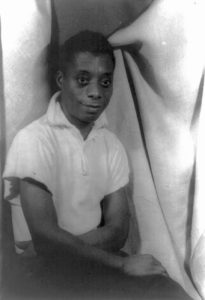
by Sudip Bhattacharya
The lump on my left arm grew. Soon, another formed. Skipping breakfast, I rushed to the local clinic. Since I was heading out for a conference in Chicago, I waited about a week for an appointment. Anxiety and fear weighed. Staying with a close friend. Thinking it would be the last time I’d ever see him. Fortunately, once I returned to New Jersey, the doctor reassured me that it was only fatty lumps, and many people have them.
Relieved, I did the most exciting thing I could think of, which was sit on a bench. Buses churned, as undergrads jumped on, squished against the windows.
Ironically, only a handful of people knew what I’d been going through. On social media, I expressed joy presenting my research, the excitement of roaming the South Side, and sharing pictures of skyscrapers.
After realizing I’d be ok, I began to reconsider my role as writer, and how much of myself do I need to expose for others.
James Baldwin was the master at finding that balance, I thought.
Since high-school, I’ve wanted to be him. Donning a perfectly tailored suit, legs crossed, and answering questions with ease and daring.
In The Fire Next Time, he provides a powerful analysis of himself and America.
Christianity, according to Baldwin, was removed from the experiences of African Americans. He knew that others shared this sentiment, and therefore, was not surprised at The Nation of Islam’s popularity.
The NOI invited Baldwin to their headquarters in Chicago. At the time, the NOI desired a separate Black nation, and Baldwin sympathized. As long as White Americans were animated by their prejudice, a multi-racial democracy would never emerge.
“And today, a hundred years after his technical emancipation, he remains—with the possible exception of the American Indian—the most despised creature in his country. Now, there is simply no possibility of a real change in the Negro’s situation without the most radical and far-reaching changes in the American political and social structure. And it is clear that White Americans are not simply unwilling to effect these changes; they are, in the main, so slothful have they become, unable even to envision them.”
Line after line, paragraph after paragraph, sparks in the dark.
“Freedom is hard to bear. It can be objected that I am speaking of political freedom in spiritual terms, but the political institutions of any nation are always menaced and are ultimately controlled by the spiritual state of that nation.”
Peeling back layers.
“The price of this transformation is the unconditional freedom of the Negro; it is not too much to say that he, who has been so long rejected, must now be embraced, and at no matter what psychic or social risk. He is the key figure in his country, and the American future is precisely as bright or as dark as his. And the Negro recognizes this, in a negative way. Hence the question: Do I really want to be integrated into a burning house?”
However, there are moments, when I wonder if he’s holding back. People forget that as much as Baldwin condemned whiteness, he shared the mainstream belief about love and unity, which was palatable for a larger audience.
“In short, we, the Black and the White, deeply need each other here if we are really to become a nation—if we are really, that is, to achieve our identity, our maturity, as men and women.”
Claudia Roth Pierpont writes in The New Yorker, “His second volume of essays, ‘Nobody Knows My Name,’ published in 1961, was welcomed by White readers as something of a guidebook to the uncharted racial landscape. Although Baldwin laid the so-called ‘Negro problem’ squarely at White America’s door, viewing racism as a species of pathology, he nevertheless offered the consoling possibility of redemption through mutual love—no other writer would have described the historic relation of the races in America as ‘a wedding.’ And he avowed an enduring belief in ‘the vitality of the so transgressed Western ideals.’ The book was on the best-seller list for six months, and Baldwin was suddenly, as much as Richard Wright had ever been, a spokesman for his race.”
Baldwin himself lived in France while he wrote.
“I was broke. I got to Paris with forty dollars in my pocket, but I had to get out of New York,” he explained for The Paris Review, “My reflexes were tormented by the plight of other people. Reading had taken me away for long periods at a time, yet I still had to deal with the streets and the authorities and the cold. I knew what it meant to be White and I knew what it meant to be a nig*er, and I knew what was going to happen to me. My luck was running out. I was going to go to jail, I was going to kill somebody or be killed. My best friend had committed suicide two years earlier, jumping off the George Washington Bridge.”
I’m at the library. Headache surging. Posting about how happy I am to be surrounded by books. I’m at Dunkin, texting a friend that I’ll be at the library soon. I’m in my apartment, with Baldwin, his hands trembling as he lights a cigarette. He asks about my lump, and I tell him what he needs to know.
AsAmNews has Asian America in its heart. We’re an all-volunteer effort of dedicated staff and interns. You can show your support by liking our Facebook page at www.facebook.com/asamnews, following us on Twitter, sharing our stories, interning or joining our staff.

RE: Indian American Writer Finds Comfort from James Baldwin after Health Scare: Great article. There’s a calmness that’s stuck with Baldwin’s name, and the fact that learning about his life experiences presents a very important narrative of what it means to be an American, and his dialogue a means to understand the forces that move and shape our nation.